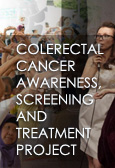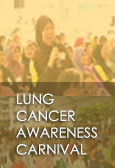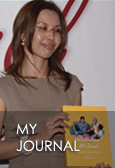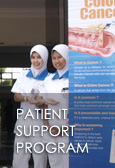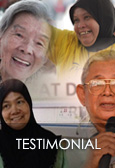Power To Empower

Empowering the less privileged to take charge of their health and to reduce the risk of cancer-related illnesses is what makes Dr Christina Ng tick, writes P. SELVARANI
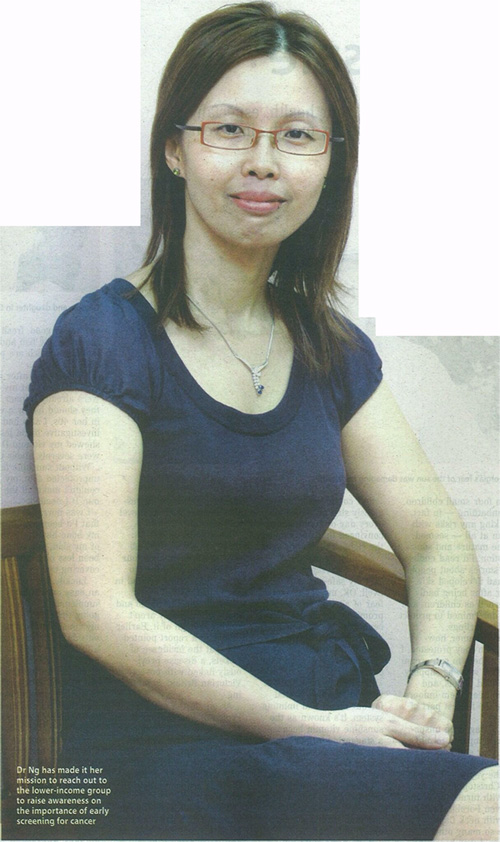
SHE works out at the gym at least three times a week and lives as healthy a life as she possibly can, juggling her busy work schedules as an oncologist and as president of the year-old cancer advocacy society, Empowered. Having seen scores of cancer-stricken patients from the lower-income group succumb to the illness due to lack of information and awareness, Dr Christina Ng has made it her mission to directly reach out to this target group by raising awareness on the importance of healthy living and early screening for cancer. "For many of the poor, survivorship is the predominant priority, so health issues take a backseat especially if they get in the way of their livelihood," says the petite, soft-spoken doctor. She adds that many of those afflicted with cancer also don't get the necessary support to help them through treatment. "Many give up treatment because of cost, and others cannot afford to give up work to go through therapy." Their low level of education and literacy also makes it difficult for them to benefit from health awareness campaigns which are. generally featured on websites and other forms of electronic media. With all this in mind, Dr Ng set up Empowered in April last year to get the community directly involved in health and cancer-related awareness campaigns. Its pilot project is the recently launched Colon Cancer Screening Community Project in Bandar Baru Sentul where screening for colorectal cancer — identified as the third-most common cause of cancer deaths in Malaysia — will be done among the 24,000 residents living in eight blocks of flats in the area.
Working with some 200 volunteer health professionals and support groups, Empowered will address the health, and lifestyle concerns of the community through education, screening, counselling and easier access to treatment. Dr Ng says many of the community leaders are receptive to the project because they know it's about saving lives and giving them better health. "We are very hands-on with this project. To make it effective, our advocacy and counselling sessions will be language-specific because of the multi-racial composition of the community there. This will also promote more personal interactions so we can reassure them if they have any anxieties."
Empowered will also work with the Welfare Department to see if the patients can be given some form of assistance so they needn't have to work while undergoing treatment. "This alleviates the fear that because they have to undergo treatment, there will be less income to feed their family. So we're not just implementing a screening campaign, but we're also holding their hand through it," Dr Ng says. While acknowledging the tremendous work of other cancer-related NGOs, Dr Ng says what's different about Empowered is that its work is focused only on the low-income group. "It's all part of the empowerment process to get these communities to take ownership of their health and ownership of promoting education and health awareness among themselves."
Her foray into the field of oncology came about during her rotation in internal medicine as a young resident doctor in Australia. "I found something different about it, a meaningful approach, and I was able to connect with this discipline immediately. Oncology is an exciting area — the kinds of diseases you come across, the kinds of people you meet. "It's also very complex because you are dealing with not just the disease, but with the person, his family, culture and religion. It's a dynamic way of practising medicine," says the Sarawakian who was raised in Brunei before she completed her high school and tertiary education in Melbourne. Her biggest challenge is in continually trying to understand her patients. "Understanding their backgrounds, their fears, their families and their expectations. To understand that context and to work within that context is the most challenging. "Every person you see is different, and you will always have a few patients who have deeper anxieties than others. You have to learn how to manage that, particularly the whole family, and to get them involved," she says. Despite having to constantly deal with the idea of death in the course of her work, Dr Ng stays positive, thanks to the success cases when cancer is detected early and patients make good recovery. She also credits her family, friends and church for helping her stay positive. When asked how she relaxes, she breaks into laughter and responds: "Oh dear, how do I relax? Do I know how to relax? I guess meeting friends and family, going out, working out, whatever that takes me away from the work function is, in itself, relaxing." The eldest of four siblings, Dr Ng enjoys listening to jazz and classical music. She even sang and played the piano-for her school choir in Melbourne. Although she does not watch much television, when she does, she prefers the light-hearted films and comedies. "It's relaxing to watch films that make you laugh. Nothing too heavy. I try not to watch medical shows, although some are quite good and the storylines sometimes reflective of the real situations we come across at work." Also, she loves salads and low-fat, high-fibre food, so it's not surprising that she counts the Mediterranean countries as among her favourite holiday destinations.



